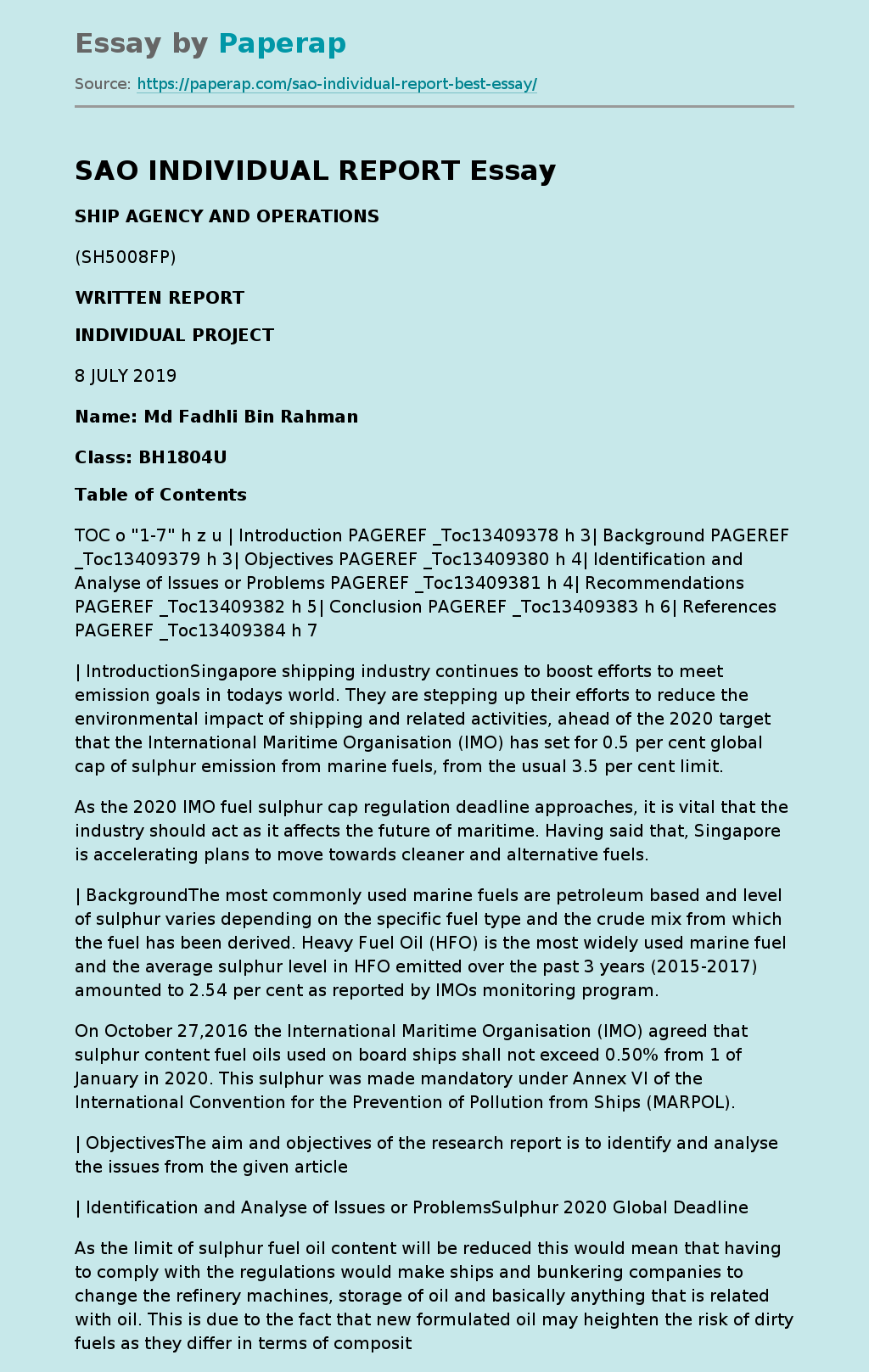SAO INDIVIDUAL REPORT
SHIP AGENCY AND OPERATIONS
(SH5008FP)
WRITTEN REPORT
INDIVIDUAL PROJECT
8 JULY 2019
Name: Md Fadhli Bin Rahman
Class: BH1804U
Table of Contents
TOC o “1-7” h z u | Introduction PAGEREF _Toc13409378 h 3| Background PAGEREF _Toc13409379 h 3| Objectives PAGEREF _Toc13409380 h 4| Identification and Analyse of Issues or Problems PAGEREF _Toc13409381 h 4| Recommendations PAGEREF _Toc13409382 h 5| Conclusion PAGEREF _Toc13409383 h 6| References PAGEREF _Toc13409384 h 7
| IntroductionSingapore shipping industry continues to boost efforts to meet emission goals in todays world. They are stepping up their efforts to reduce the environmental impact of shipping and related activities, ahead of the 2020 target that the International Maritime Organisation (IMO) has set for 0.
5 per cent global cap of sulphur emission from marine fuels, from the usual 3.5 per cent limit.
As the 2020 IMO fuel sulphur cap regulation deadline approaches, it is vital that the industry should act as it affects the future of maritime. Having said that, Singapore is accelerating plans to move towards cleaner and alternative fuels.
| BackgroundThe most commonly used marine fuels are petroleum based and level of sulphur varies depending on the specific fuel type and the crude mix from which the fuel has been derived.
Heavy Fuel Oil (HFO) is the most widely used marine fuel and the average sulphur level in HFO emitted over the past 3 years (2015-2017) amounted to 2.54 per cent as reported by IMOs monitoring program.
On October 27,2016 the International Maritime Organisation (IMO) agreed that sulphur content fuel oils used on board ships shall not exceed 0.50% from 1 of January in 2020. This sulphur was made mandatory under Annex VI of the International Convention for the Prevention of Pollution from Ships (MARPOL).
| ObjectivesThe aim and objectives of the research report is to identify and analyse the issues from the given article
| Identification and Analyse of Issues or ProblemsSulphur 2020 Global Deadline
As the limit of sulphur fuel oil content will be reduced this would mean that having to comply with the regulations would make ships and bunkering companies to change the refinery machines, storage of oil and basically anything that is related with oil. This is due to the fact that new formulated oil may heighten the risk of dirty fuels as they differ in terms of composition.
Liquefied Natural Gas (LNG)
LNG is a reliable marine fuel because it provides a future-fit solution for the shipping industry.
Despite all the benefits that LNG provides, it can cause harm with leakage of methane when drilling, fracking or distributing. As methane is more dangerous than carbon dioxide, unburned methane becomes 86 times more potent at trapping heat in the atmosphere thus harming the environment.
Cleaner Alternatives for Marine Fuels
Biofuel
Although Biofuel may be an alternative, the shipping industry needs to reconsider its expensive cost and conversion of engine to process biofuel. Some companies might still use fossil fuel instead of changing because of the price tagged on biofuel. This however could be a hindrance to shift them to environmentally friendly fuel.
Methanol
Methanol is a safe, cost-effective alternative marine fuel but having low flash point and corrosive might be a hazard to the surroundings.
Low flash point would mean that the liquid can be easily ignited which is dangerous to the environment especially when discharging it from or to the vessel. Furthermore, causing corrosion to the materials used to handle the liquid may be a problem as workers may need to change them time to time in which it could cost money to replace it.
| Recommendations
It is recommended that all vessels are to install new Exhaust Cleaning Gas System also known as scrubbers to accommodate the new sulphur fuel. Companies will need to invest money to buy new machineries so that their new fuels could process alongside the new engine system to run smoothly.
In order to prevent hazards, costly changes are needed to port infrastructures so that workers can perform discharging of fuel safely without the leaking of methane. Also, to run on LNG, vessels require new engine modification, gas tanks and increase cost to equip LNG tanks.
Cleaner Alternatives for Marine Fuels
Biofuel
The use of biofuel is expensive because of the technology used to process the fuel. It is recommended that increased investments in research on biofuel production and using IMO to promote and encourage the use. Also, biofuels are based on waste or residues thus they do not face competition with food crops.
Methanol
To avoid having corrosive fuel tanks, it is recommended researchers would need to find compatible materials to match the liquid so as to not corrode the storage tank. In addition to the problem.
| ConclusionTo conclude this report, large investments are needed to change infrastructures or clean fuel at such a pace but in hopes to better the atmosphere, it is understandable that these actions are taken.
Pros and cons are inevitable in this industry and that is why there are measures implemented by the International Maritime Organisation (IMO) to facilitate the new rules, technologies and machines.
With these regulations, the maritime industry hope they can better their working environment.
Word count: 800
| ReferencesKingsland, P. (2018, October 03). Biofuels for shipping: Will the industry ever get on board? Retrieved June 25, 2019, from
Complying with the 2020 sulphur cap: Challenging issues. (2019, February 12). Retrieved June 25, 2019, from
Study: LNG as Marine Fuel Expensive Distraction for EU. (n.d.). Retrieved July 1, 2019, from
(n.d.). Retrieved June 25, 2019, from
Paraskova, T. (2018, September 24). Are Biofuels A Viable Alternative For The Shipping Sector? Retrieved June 27, 2019, from
SAO INDIVIDUAL REPORT. (2019, Nov 18). Retrieved from https://paperap.com/sao-individual-report-best-essay/

